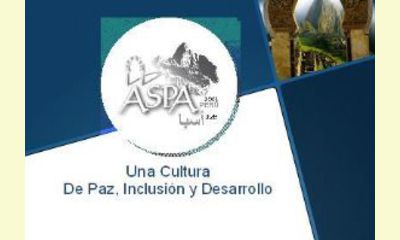|
|
Slogan of the ASPA Summit: A culture of peace, inclusion and development
un articulo por Andina, Peruvian news agency
"A culture of peace, inclusion and development" is
the slogan of the Third Summit of Heads of State
and Government of South America and the Arab
Countries (ASPA) to be held in Lima October 1 and 2.

Slogan of the ASPA Third Summit
click on photo to enlarge
According to information from the Peruvian
Ministry of Foreign Affairs, the slogan reflects
the interest of both regional blocs to strengthen
historical, political, social and cultural
relations, despite the geographical distance
between Arab and South American nations.
There are 12 countries in the Union of South
American Nations (UNASUR) and 22 states gathered at
the Arab League of Nations.
The slogan will be accompanied by the official
image of the ASPA Summit, which will be represented
by an arabesque arch and background of the Inca
citadel Machu Picchu.
Under this slogan, the Third ASPA Summit will take
place two days at the Ministry of Culture, in the
Peruvian capital. Preceding the summit will be a
meeting on Sunday September 30 of foreign
ministries of the participating countries. They
already held an initial preliminary meeting at the
67th General Assembly of the United Nations in New
York.
At the first meeting, the officials will refine
the terms and wording of the Lima Declaration to
be signed by the participating countries, as well
as various instruments and documents emanating
from the meeting of foreign ministers and heads of
state and government.
(Click here for a Spanish version of this article)
|








|
DISCUSSION
Pregunta(s) relacionada(s) al artículo :
Can the culture of peace be established at the level of the state?,
* * * * *
Comentario más reciente:
:
The state has come, over the centuries, to monopolize the culture of war. It would require a radical change in its very nature for it to abandon the culture of war and adopt a culture of peace.
For details on how the state has come to monopolize the culture of war, see The History of the Culture of War

|
|









